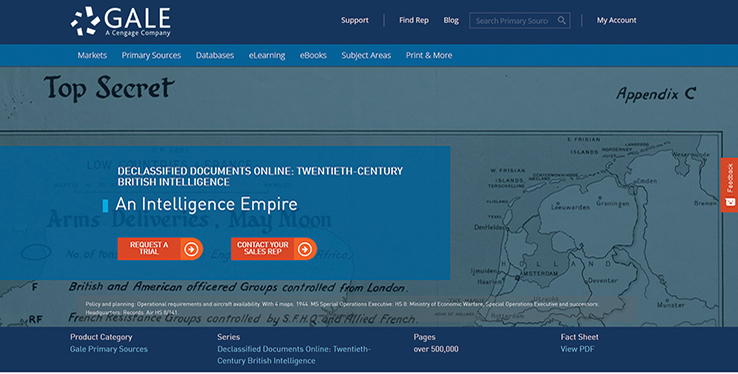Declassified Documents Online: Twentieth-Century British Intelligence | Reference eReviews
This resource from Gale features 500,000 pages of previously classified information on the intelligence services of Britain and the British Empire from 1905 to 2002. The archive provides perspectives on British espionage, global polices and strategies, international relations, international politics, and secret operations prior to World War I through the dismantling of the British Empire and creation of a new world order in the late 20th century.
Gale’s Declassified Documents Online: Twentieth-Century British Intelligence
CONTENT
This resource from Gale features 500,000 pages of previously classified information on the intelligence services of the British Empire from 1905 to 2002. The archive provides perspectives on British espionage, global polices and strategies, international relations, international politics, and secret operations prior to World War I through the dismantling of the British Empire and creation of a new world order in the late 20th century.
The database covers Britain’s sphere of influence, including India, South Africa, Canada, Australia, and the Middle East as a whole. The documents come from five UK government departments: the Security Service (MI5), the Ministry of Defence’s Communications and Intelligence Records, the Special Operations Executive, the Colonial Office’s Intelligence and Security Office Departments, and the Cabinet Office. Materials include personal, subject, and policy files; reports; memoranda; intelligence assignments; and surveillance records. The database is available on the Gale Primary Sources platform, which enables cross-searching across topics in other Gale products.
USABILITY
Consistent with other Gale databases, this archive is an extensive and easy-to-access collection of essential primary source materials. The home page features a large basic search box, an advanced search option, and general information about the resource, with links to an “About” page, materials grouped by department, research tools, search history, and “get link.”
A topic finder visualizes connections between search terms and topics to identify relevant articles, while the term frequency option explores the coverage of search terms graphed over time.
From the main page, users can enter a term in the basic search box or click on “Advanced Search,” where they can browse collections by keyword, document, document type, subject, manuscript number, and Gale document number. Searches can be limited by date of creation, date of declassification, department, classification level, subcollection, regional focus, illustrated works, or language. Users can search in nine languages (including Spanish, French, German, and Italian). Response time is excellent, starting new inquiries is simple, and navigating within the database is effortless.
Search terms are highlighted in the text. Moreover, page numbers where terms are found in the text are listed under “Search Term Hits.” Users can also search for terms within a retrieved document. Documents are easy to read and can be enlarged, downloaded, printed, emailed, shared, and sent to Google Drive or OneDrive. Citations can be exported to a variety of citation manager software programs in APA, Chicago, Harvard, or MLA styles.
PRICING
Perpetual access purchase options are available starting at $6,600 for academic libraries; pricing is based on the size of the institution, as well as Carnegie type and budget level. Subscriptions are also available, as are trials.
VERDICT
This is an important database for researchers and students of 20th-century international relations, British history, and Cold War operations. Both experienced scholars and casual browsers will appreciate the intuitive interface and numerous search options. Quality organization and enhanced features add to the archive’s value and usability. In sum, this is a significant resource of British intelligence and security policy information and an excellent companion database for libraries that already own or subscribe to Gale’s U.S. Declassified Documents Online.
Rob Tench is a Librarian at Old Dominion University Libraries, Norfolk, VA.
RELATED
ALREADY A SUBSCRIBER? LOG IN
We are currently offering this content for free. Sign up now to activate your personal profile, where you can save articles for future viewing










Add Comment :-
Comment Policy:
Comment should not be empty !!!